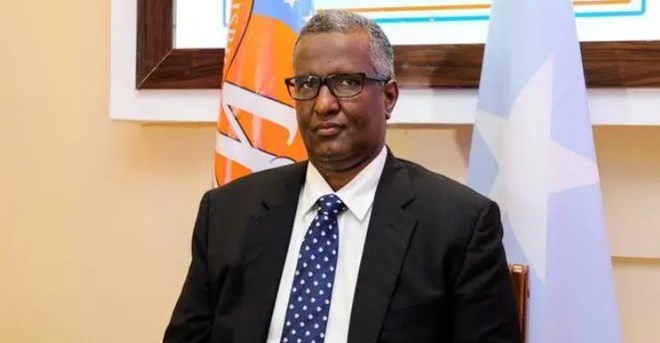
Tuesday August 26, 2025

Abdirahman Abdishakur Warsame, leader of Somalia’s Wadajir Party and a senior figure in the Somali Salvation Forum, speaks out against the new election accord reached between Villa Somalia and part of the opposition, Mogadishu, August 2025. SUPPLIED
Mogadishu (HOL) — Somalia’s federal government and part of the opposition
reached an election accord after two months of negotiations, rolling back controversial 2024 constitutional changes, but a divided opposition bloc says the deal is incomplete and risks prolonging the country’s political crisis.
The deal, announced this week, rolls back several provisions passed in March 2024 that had expanded presidential powers and triggered a federal–regional rupture. Under the new framework, the Federal Parliament will elect the president, reversing a push toward direct presidential elections. Federal member state leaders will select members of parliament, preserving an indirect system while pledging eventual transition to one-person, one-vote.
The president will still appoint a prime minister, but the House of the People will retain authority to confirm or dismiss the nominee, restoring a legislative check that was stripped out in the 2024 package. Political groups that secure at least 10 percent of parliamentary seats will now qualify for national party status, a compromise that avoids imposing a strict two- or three-party limit.
Supporters describe the framework as a concession-driven compromise meant to restore unity and credibility to Somalia’s democratic process. But the opposition Somali Salvation Forum remains divided. Four of its members signed the accord with Villa Somalia, while others have openly rejected it.
Abdirahman Abdishakur Warsame, leader of the Wadajir Party, told the BBC the accord reflected “the personal views of those who signed with the president,” not the Forum’s collective stance. He argued that the government’s record on the Gedo crisis, relations with federal states, misuse of public funds, and the fight against al-Shabab is as troubling as the election model itself.
Abdishakur also criticized the agreement for addressing only four disputed constitutional provisions and dismissed the president’s electoral timeline as “unrealistic under current conditions.”
The split has produced two parallel tracks. The bloc of opposition leaders who signed the framework, including former Prime Minister Omar Abdirashid Ali Sharmarke, former parliamentary speakers Sharif Hassan Sheikh Adan and Mohamed Mursal, and former Information Minister Dahir Mohamud Gelle, is now moving to
brief international envoys in Mogadishu. According to officials familiar with the meeting, the delegation will outline a timetable for implementation, seek external support, and discuss registering a political party to contest future elections.
The Forum faction that stayed out of the deal has yet to issue a formal response, but its leaders insist they will continue opposing the government. Several senior Forum members resigned on August 24, underlining the challenge of maintaining a united opposition.
Analysts note that buy-in from Puntland and Jubaland, both of which cut ties with Mogadishu after the 2024 amendments, will be decisive. Without state-level cooperation, preparations for nationwide polls could stall. The treatment of term lengths, extended from four to five years under the earlier amendment package, also remains unclear and is expected to be clarified in the coming months.








